The Pocket Containers Market is estimated to be valued at USD 315.4 million in 2025 and is projected to reach USD 489.8 million by 2035, registering a compound annual growth rate (CAGR) of 4.5% over the forecast period.
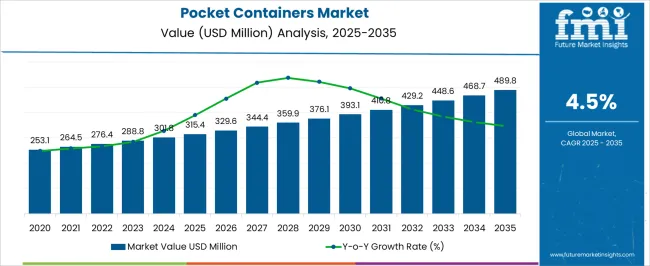
| Metric | Value |
|---|---|
| Pocket Containers Market Estimated Value in (2025 E) | USD 315.4 million |
| Pocket Containers Market Forecast Value in (2035 F) | USD 489.8 million |
| Forecast CAGR (2025 to 2035) | 4.5% |
The pocket containers market is undergoing robust development driven by increasing consumer demand for compact, lightweight, and travel-friendly packaging across personal care, pharmaceutical, and hygiene sectors. Evolving urban lifestyles, combined with higher mobility and space-conscious consumer behavior, have led to the adoption of pocket-sized formats that support convenience without compromising product integrity. Manufacturers are increasingly leveraging sustainable materials, advanced molding techniques, and user-friendly dispensing mechanisms to cater to changing functional and aesthetic expectations.
Rising environmental awareness has also spurred demand for recyclable, reusable, and bio-based pocket containers, encouraging R&D investments across key packaging hubs. Additionally, the integration of smart labeling, tamper-evident seals, and minimalistic branding is aligning with premiumization trends in cosmetic and personal care product lines.
In the near future, continued innovation in material science and demand from e-commerce-ready packaging formats are expected to shape new growth avenues Strategic focus on design ergonomics, leak-proof mechanisms, and compliance with global packaging safety standards will further drive global adoption of pocket containers.
The market is segmented by Material, Packaging Format, and End Use and region. By Material, the market is divided into Plastic and Metal. In terms of Packaging Format, the market is classified into Bottle, Flask, and Boxes & Cartons. Based on End Use, the market is segmented into Cosmetic & Personal Care, Food & Beverage, Pharmaceutical, and Other Consumer Goods. Regionally, the market is classified into North America, Latin America, Western Europe, Eastern Europe, Balkan & Baltic Countries, Russia & Belarus, Central Asia, East Asia, South Asia & Pacific, and the Middle East & Africa.
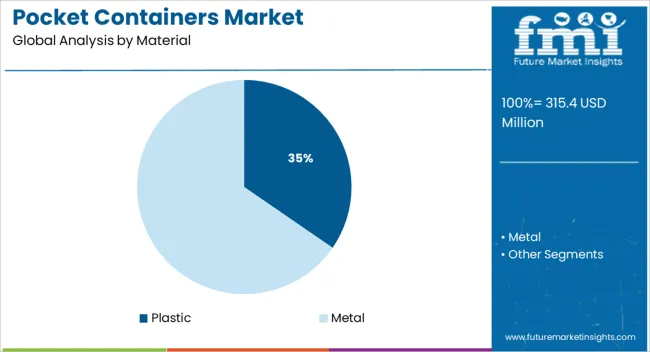
The plastic segment is expected to account for 34.6% of the pocket containers market revenue share in 2025, reflecting its widespread utility across diverse end-use categories. This segment’s leading position is being supported by plastic’s flexibility, cost-effectiveness, and compatibility with various forming and sealing processes. Plastic materials such as polyethylene and polypropylene have enabled high-volume production of lightweight, impact-resistant containers that can withstand regular handling during travel or daily use.
The adaptability of plastic to custom shapes and decorative finishes has also contributed to its strong preference among brand owners. Furthermore, advances in post-consumer recycled resins and bio-based alternatives have allowed plastic-based pocket containers to align with sustainability goals, increasing their acceptance across both premium and mass-market brands.
Enhanced durability, transparency, and printability have made plastic containers suitable for high-visibility shelf displays and direct-to-consumer formats Continued innovation in polymer blends and barrier coatings is expected to reinforce plastic’s relevance as a dominant material in portable packaging solutions.
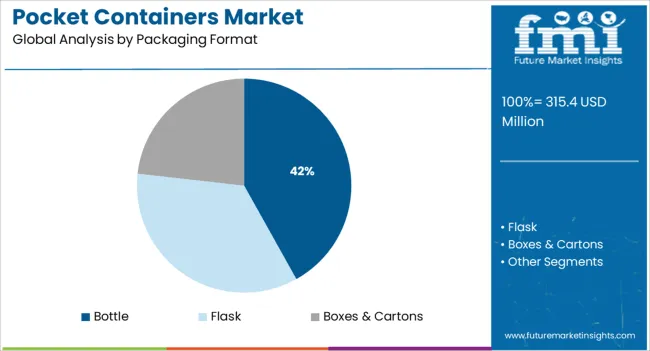
The bottle format is projected to capture 41.9% of the overall market share in the pocket containers segment in 2025, driven by its user familiarity, ergonomic handling, and secure closure systems. Bottles have remained a preferred format due to their ability to house a wide range of liquid, gel, or spray-based products while ensuring precise dispensing and leak resistance. The compact structural design and lightweight nature of pocket-sized bottles have been favored by consumers seeking portability without compromising functionality.
The format’s compatibility with tamper-proof caps, atomizers, and flip-top lids has further expanded its applications in cosmetic, sanitizer, and pharmaceutical use cases. The scalability of bottle production using blow molding and injection technologies has enabled rapid deployment for large-scale commercial launches.
Additionally, the growing trend toward refillable and recyclable formats is being supported through PET and HDPE bottles, enhancing their sustainability credentials As demand for compact yet effective personal and hygiene care products grows, the bottle format continues to dominate pocket container design choices.
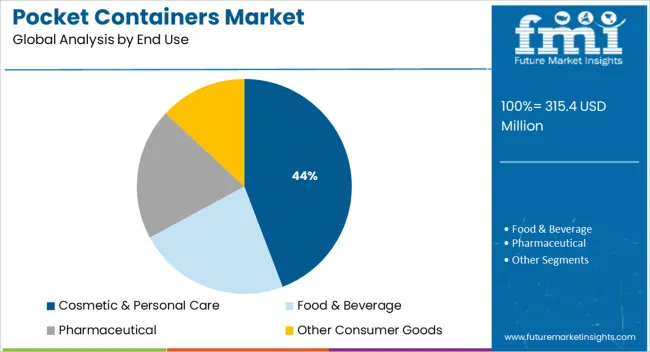
The cosmetic and personal care segment is projected to contribute 44.2% of the pocket containers market revenue share in 2025, underscoring its role as the largest end-use segment. This segment’s expansion has been driven by the increasing consumer focus on personal hygiene, skincare, and beauty routines, particularly among urban and traveling populations. The convenience of carrying small-volume containers for creams, serums, sprays, and gels has supported demand from both male and female demographics.
Brands operating in this space are leveraging pocket containers for sample-sized packaging, travel kits, and on-the-go grooming solutions that match modern lifestyles. Enhanced aesthetics, ease of use, and reusability are being prioritized in packaging innovation to meet consumer expectations for premium and sustainable design.
Pocket containers in this segment are also being optimized for e-commerce delivery, shelf appeal, and gifting formats Continued product diversification and grooming awareness across age groups are expected to solidify the dominance of cosmetic and personal care as the primary driver of pocket container adoption globally.
The global sales of pocket containers grew at a moderate CAGR during the historical period of 2020 and 2024. However, with growing demand for compact and lightweight packaging solutions across industries like pharmaceutical, food & beverage, and personal care & cosmetics, the overall pocket containers market is anticipated to grow at a steady CAGR of 4.5% over the forecast period.
There has been a growing trend of miniaturization across the global manufacturing landscape that has influenced packaging companies to offer packaging formats that are convenient and compact in terms of storage in pockets. To meet the varied requirements of the customers, the key players in the packaging industry are offering pocket containers with features such as moisture and heat resistance.
Pocket containers are used widely in the pharmaceutical and food & beverage industries, which is expected to create significant demand due to the growing demand for convenient and compact containers from the end users. Growing demand for compact and convenient packaging formats to store things in the pockets of consumers is anticipated to boost the growth of pocket containers in the next few years.
Growing Demand for Lightweight and Compact Packaging
Pocket containers are small boxes or pocket-sized containers used for storing items conveniently in the pockets. These containers are lightweight and use less than 75% of plastics as the rigid type of packaging.
These containers provide economical and customizable packaging solutions. Pocket containers are convenient and portable and thus offer easy storage in pockets. As demand for lightweight and compact packaging is gaining immense momentum across various industries, a positive growth trajectory has been predicted by FMI for the global pocket containers market during the forecast period.
Flourishing Food & Beverage Industry Worldwide
Pocket containers find wide usage in the food & beverage industry due to their convenient packaging outlook along with the ability to resist moisture, heat, and air. The growing trend of consumption of on-the-go food and beverages across the world is boosting the demand for convenient packaging formats like pocket containers and the trend is likely to continue over the next ten years.
Pocket containers are compact and moisture-resistant and help consumers store miniaturized things conveniently in their pockets. All these factors are likely to propel the growth of the pocket containers market in the near future.
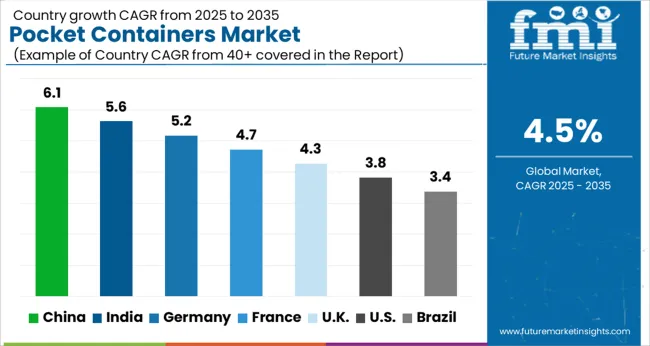
Growing Demand for Compact and Convenient Packaging Solutions to Drive the USA Market
As per the USA. Department of Agriculture (USDA), the food segment accounted for an 11.9% share of the average USA household’s expenditure in 2024. The USA is the largest consumer of pocket containers and is expected to reach a market valuation of USD 489.8 Million by 2035.
Growth of the pocket containers market in the USA is due to the rising demand for compact and convenient food packaging by consumers, rapid growth of pharmaceutical industry, and heavy presence of leading packaging giants. Moreover, the trend of consumption of on-the-go and ready-to-eat meals is expected to further drive the pocket containers market in the country during the forecast period.
Surging Pharmaceuticals Production and Exports to Push the Demand for Pocket Containers in India
According to Future Market Insights, India will continue to remain a lucrative market for pocket containers due to rapid expansion of pharmaceutical and cosmetics & personal care sectors, easy availability of raw materials at much lower prices, increasing consumer spending.
Over the years, there has been a rapid growth of the pharmaceutical industry in India due to rising exports of various pharmaceutical products, increasing investments in R&D, and favorable government support. According to the Indian Economic Survey 2024, India’s domestic pharmaceutical market stood at USD 301.8 billion in 2024 and is likely to reach USD 120-489.8 billion by 2035.
Furthermore, total Indian drug & pharmaceutical exports stood at USD 24.60 billion in FY22 and USD 24.44 billion in FY21, and this number is further expected to surge during the next ten years. Driven by this demand for pocket containers is set to grow at a steady pace in the country. Similarly, rising usage across the food and beverage industry will create opportunities for pocket containers market in the country during the forthcoming period.
Plastic Pocket Containers to Gain Traction due to Their Inexpensive Nature
As per FMI, plastic will continue to remain the most preferred material type for making pocket containers and is set to create revenue opportunities of USD 489.8 Million by the end of 2035. Growth of the plastic segment is attributed to the rising end user preference for using pockets containers made from plastic due to their lightweight, low cost, and durable nature.
Among all plastics, polypropylene (PP) is widely used for making pocket containers as it is inexpensive, possesses high flexural strength, and is highly resistant to moisture. Plastic as an inexpensive material is likely to create high profits for pocket container manufacturers during the forecast period. Thus, increasing demand for plastic pocket containers by various end users is expected to create lucrative growth opportunities for manufacturers in the next few years.
The Pharmaceutical Sector is Likely to Demand for New Pocket Containers
Based on end use, demand for pocket containers is expected to rise at the highest pace in the pharmaceutical sector owing to an increase in the usage of pocket containers for carrying medications in the form of pills due to their convenient packaging format.
Pharmaceutical manufacturers are increasingly adopting pocket containers as packaging solutions for storing drugs as they provide convenience to consumers in terms of storage. Factors such as rising prevalence of chronic diseases, increasing spending on medications, and growing usage of pocket containers for packaging pills will continue to trigger growth of the pharmaceutical segment during the forecast period.
Similarly, in order to improve their revenue share and grab emerging opportunities from the pharmaceuticals sector, key players in the pocket containers market are focusing on developing products that can keep the pills intact from any external environmental factors like moisture and heat. This will further expand the pocket containers market size over the next ten years.
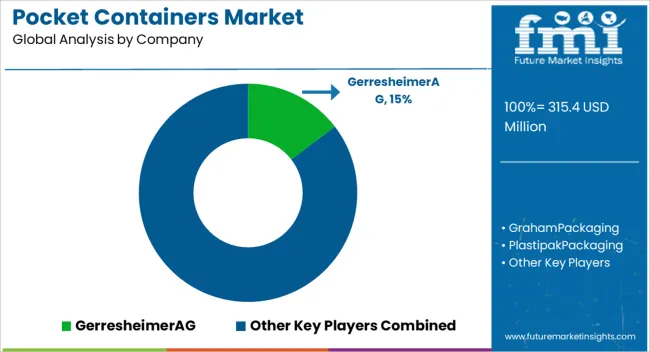
The global pocket containers market is fragmented and competitive in nature with the key players constantly expanding their product portfolios by launching new products. Besides this, they are using various tactics such as collaborations, mergers & acquisitions, and partnerships to improve their market share and remain relevant in the global packet containers market.
Constar International is one of the top producers of polyethylene terephthalate (PET) plastic containers in the world. With the help of creative thinking, extensive industry experience, and cutting-edge materials science, the company has developed new monolayer PET barrier technology and structures that enable it to develop packaging solutions for the opportunities and challenges that food and beverage companies are most concerned with, such as product protection, consumer appeal, and sustainability.
Since its establishment in 1927, Constar has become Europe’s leading manufacturer of PET platforms, bottles, containers, and closures. The company offers packaging solutions ranging from small 16g preforms up to large 85Gm performs in diverse finishes to suit many applications.
Oval PET bottles for foods and barrier PET bottles for beer were made possible by Constar's technological advancements over the years. Constar provides clients with fresh choices for more environmentally friendly packaging that satisfies retailer, consumer, and cost objectives while maintaining the desired performance and aesthetics.
Another key manufacturer and supplier of pocket containers is Alpha packaging. Alpha Packaging has emerged as a leading producer of plastic bottles and jars for specialized foods, medicines, dietary supplements, home chemicals, and food goods.
For consumer industries that are quickly expanding, such as the nutrition, pharmaceutical, personal care, and specialty food and beverage categories, Alpha is a leading blow-molder of bottles and jars. With its headquarters in St. Louis, Missouri, Alpha currently has 10 production plants, eight of which are located in North America.
The company is continuously striving to expand its presence across Europe and other regions. For instance, in April 2024, it announced the acquisition of Boxmore Plastics Limited ("Boxmore"), a prominent producer and designer of premium plastic bottles and jars, has been acquired by Alpha Packaging.
Another leading player in this packaging space is Plastipak Packaging, Inc., a fully owned subsidiary of Plastipak Holdings, Inc. Plastipak employs more than 6,000 people in more than 60 locations across the Americas, Europe, Africa, and Asia, with a focus on innovation.
Some of the most famous and recognisable consumer brands in the world are among its clients. With more than 500 USA patents for its cutting-edge package designs and production techniques, Plastipak is a market leader in packaging innovation.
In January 2025, a huge investment was made by Plastipak in the design, production, and recycling of plastic containers, to greatly increase its PET recycling capacity at its manufacturing facility in Bascharage, Luxembourg.
Similarly, in June 2020, in order to create and commercialize industrial scale PET chemical recycling for use in preform and bottle applications, Plastipak Italia Preforme s.r.l., a division of Plastipak Packaging, and Garbo S.r.l. have entered into an exclusive partnership in Italy. Plans for extending the exclusive relationship internationally are included in the deal.
| Attribute | Details |
|---|---|
| Estimated Market Size (2025) | USD 276.4 million |
| Projected Market Size (2035) | USD 429.2 million |
| Value-based CAGR (2025-2035) | 4.5% CAGR |
| Forecast Period | 2025 to 2035 |
| Historical Data Available for | 2020 to 2024 |
| Market Analysis | Value (USD million) and Volume (000 Units) |
| Key Regions Covered | North America; Latin America; Europe; Middle East & Africa; East Asia; South Asia and Oceania |
| Key Countries Covered | USA, Canada, Brazil, Mexico, Germany, Spain, Italy, France, UK, Russia, China, India, Australia & New Zealand, GCC Countries, and South Africa |
| Key Segments Covered | Material Type, Packaging Format, End Use, and Region |
| Key Companies Profiled | Gerresheimer AG; Constar International; CKS Packaging; Alpha Packaging Holdings; TYH Container Enterprises; Vidchem pty ltd.; APTACA Spa; USON Plast; Graham Packaging; Plastipak Packaging |
| Report Coverage | Market Forecast, Company Share Analysis, Competition Intelligence, DROT Analysis, Market Dynamics and Challenges, and Strategic Growth Initiatives |
The global pocket containers market is estimated to be valued at USD 315.4 million in 2025.
The market size for the pocket containers market is projected to reach USD 489.8 million by 2035.
The pocket containers market is expected to grow at a 4.5% CAGR between 2025 and 2035.
The key product types in pocket containers market are plastic, _pp, _pet, _pe and metal.
In terms of packaging format, bottle segment to command 41.9% share in the pocket containers market in 2025.






Full Research Suite comprises of:
Market outlook & trends analysis
Interviews & case studies
Strategic recommendations
Vendor profiles & capabilities analysis
5-year forecasts
8 regions and 60+ country-level data splits
Market segment data splits
12 months of continuous data updates
DELIVERED AS:
PDF EXCEL ONLINE
Pocket Tissues Market Size and Share Forecast Outlook 2025 to 2035
Pocket Video Camera Market Size and Share Forecast Outlook 2025 to 2035
Pocket Flask Market
Pocket Pedometers Market
Pocket Ventilation Systems Market
Multi Pocket Holders Market Size and Share Forecast Outlook 2025 to 2035
PS Containers Market Size and Share Forecast Outlook 2025 to 2035
PET Containers Market Growth, Demand and Forecast from 2025 to 2035
PUR containers packaging Market
Roll Containers Market Size and Share Forecast Outlook 2025 to 2035
HDPE Containers Market Insights & Growth Outlook 2025 to 2035
Market Share Breakdown of Roll Containers Manufacturers
Foam Containers Market
Soup Containers Market
Metal Containers Market Demand & Packaging Innovations 2025 to 2035
Steel Containers Market Analysis by Product Type, Capacity Type, End Use, and Region through 2025 to 2035
Key Players & Market Share in the Steel Containers Industry
Smart Containers Market
Spout Containers Market
Tottle Containers Market Size and Share Forecast Outlook 2025 to 2035

Thank you!
You will receive an email from our Business Development Manager. Please be sure to check your SPAM/JUNK folder too.
Chat With
MaRIA